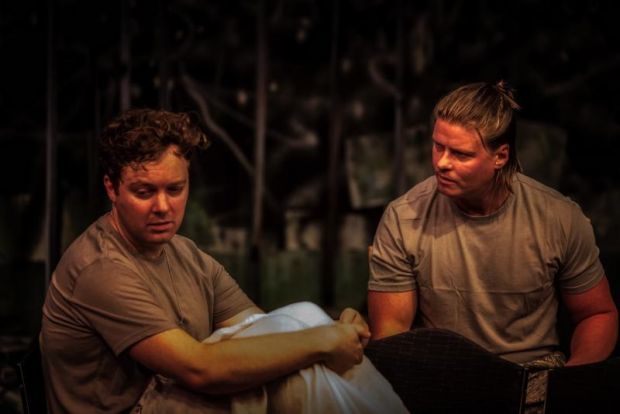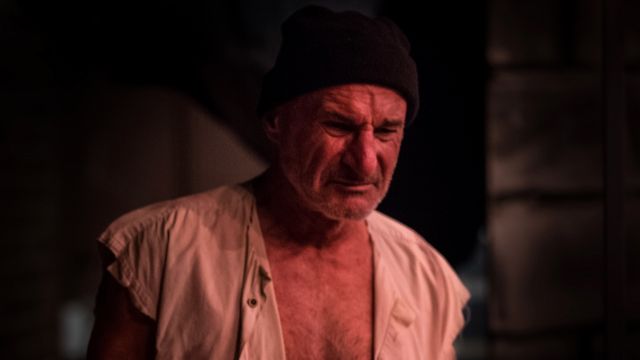Bengal Tiger At The Baghdad Zoo
Set in war-torn Baghdad in 2003, interestingly, playwright Rajiv Joseph says that Bengal Tiger At The Baghdad Zoo is not necessarily about war and the conflict in Iraq. A short article in the New York Times in 2003 about bombs destroying the Baghdad Zoo, American soldiers guarding the zoo and a soldier who lost his hand feeding a Bengal tiger which was subsequently shot, inspired Joseph to write this complex, multi-faceted play. The style is known as a documentary drama, using imagined and real places and events. While history tells us that the American soldiers first saw this war as a mission of freedom, the Iraqis saw it as ruin of their culture. It is through this lens that we are introduced to the characters and the story. Winning the 2008 NEA Award for Outstanding New American Play, its characters and ideas are challenging and varied.
Nick Fagan, well regarded as a risk-taking director, has drawn together an impressively skilled cast, each player bringing richness and individuality to their role, but it is undoubtedly David Grybowski’s play. Inhabiting the title role like a comfortable suit, he struts, he prowls, he growls, he is languid and he is fiercely vulnerable. Winning the Broadway.com Audience Choice Awards in 2011, performing the role of the tiger, legendary actor Robin Williams made his final Broadway appearance before his death in 2014 and it is Williams that Grybowski often channels in this play, introducing fun, playful musing and real menace.

Armed with many witty, cleverly written and human frustrations, Grybowski’s tiger is nuanced and relatable, if you believe in talking tiger ghosts, that is. The story of the tiger’s quest for redemption, having eaten two children, is wonderfully summed up with his line - ‘When an atheist suddenly finds himself walking around after death, he has got some serious re-evaluating to do.’
The audience is subsequently treated to a parade of ghosts, each haunting a key player in their life. Oliver De Rohan, as Tom, despite some early lapses in accent, draws a wonderfully nuanced, painfully naïve character as Kev. With his growing post-death wisdom, he moves from gauche to becoming a wise conscience in the story, trapped in the afterlife, powerfully commenting on what seems to be an inevitable series of consequences.

Noah Fernandes is totally despicable as Saddam Hussein’s evil dead son Uday. He swaggers, he circles and taunts effectively, but I would have liked a little less shouting and more quiet menace in his performance, and indeed with many of the roles. They say that there are no small parts in a play, and comment must be made about Anita Zamberlan Canala’s focussed and believable work as both an hysterical woman and a quietly resigned leper. Vocally, including speaking in Arabic, her work was noteworthy, as was Nadia Talottas as both a poignant, cruelly wronged sister, and a casually disinterested and funny prostitute.
Nigel Tripodi ,as Musa, carries the difficult role of the Interpreter, selling his soul to the Americans with vulnerability and passion. Often needing to ‘anchor’ the story, he uses the stage well, conveying being frustrated, trapped and desperately sad and guilty of his sister’s unimaginable ending. Adam Touminen portrays ‘the ugly American’ who some might say, justifiably, loses his hand, and ultimately his life, spurred on by greed. His mortal wounding scene is both believable, and somewhat satisfying, possibly telling us that no good comes from self-centred greed.

The work of the technical team is highly credible, with Richard Parkhill’s lighting, Heather Jones’s props and costumes and Sean Smith’s sound bed all being apt and key elements in this play. I particularly admired Tony Clancy’s scenic design work and loved the graffiti in both English and Arabic. I rarely comment on stage crews, but this team did a seamless job, ensuring that the audience remained connected with many scenes to swiftly segue into.
Whilst watching this play, I grappled with what the theme might be, and it is more clever than a single idea as it parades a number of the ‘deadly sins’ - greed, lust, envy and pride - enabling Joseph to draw multi-faceted characters and themes. There is friendship, a quest for redemption and an exposé of human power, weakness and greed, just to ponder a few themes and prisms. Patrons should be aware that there is crude language and explicit sex, but both are handled appropriately.

Once again, The Guild successfully challenges us with relevant and interesting theatre. It is worth the entry price just to see Grybowski’s tiger in all its glory
Jude Hines
Subscribe to our E-Newsletter, buy our latest print edition or find a Performing Arts book at Book Nook.

